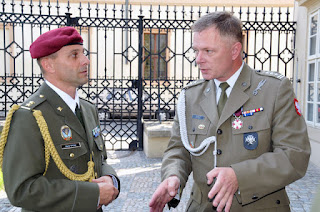Geography doesn't change. To a slightly lesser extent, neither do historic patterns.
Even if Ukraine wins the Russo-Ukrainian War, Russia will still be to the east from Central Europe.
She will be back in one form or another.
After the fall of the Soviet Union, liberation, and joining NATO - helped with a lot of ahistorical thinking on both sides of the Atlantic - there was a bit of hedging that there was time to rebuild Central European economies and civil society before a threat from the east came back. For almost three decades the former Warsaw Pact members of NATO let their military capabilities and investments fall closer to 1% of GDP as opposed to the 2% minimum.
The events of the last decade have sobered up everyone from Estonia to Bulgaria, but for most of those nations, by free-riding on their richer nations to the west for national defense, they lost or allowed to almost die what domestic arms manufacturing they had remaining from communism.
Everyone - well those who are paying attention - now realize the existential requirement to have at least the most basic domestic production capabilities to defend yourself, regardless what accountants may say.
The last year is seeing once strong medium powers in Central Europe bring capacity back online.
Good for them, good for all alliance members;
Still wary of Russia, their Soviet-era master, some former Warsaw Pact countries see helping Ukraine as a matter of regional security.
...
“Taking into account the realities of the ongoing war in Ukraine and the visible attitude of many countries aimed at increased spending in the field of defence budgets, there is a real chance to enter new markets and increase export revenues in the coming years,” said Sebastian Chwalek, CEO of Poland’s PGZ.
State-owned PGZ controls more than 50 companies making weapons and ammunition – from armoured transporters to unmanned air systems – and holds stakes in dozens more.
It now plans to invest up to 8 billion zlotys ($1.8 billion) over the next decade, more than double its pre-war target, Chwalek told Reuters. That includes new facilities located further from the border with Russia’s ally Belarus for security reasons, he said.
Other manufacturers too are increasing production capacity and racing to hire workers, companies and government officials from Poland, Slovakia and the Czech Republic said.
...
Chwalek said PGZ would now produce 1,000 portable Piorun manpad air-defence systems in 2023 – not all for Ukraine -compared to 600 in 2022 and 300 to 350 in previous years.
The company, which he said has also delivered artillery and mortar systems, howitzers, bulletproof vests, small arms and ammunition to Ukraine, is likely to surpass a pre-war 2022 revenue target of 6.74 billion zlotys.
...
Czech arms exports this year will be the highest since 1989, he said, with many companies in the sector adding jobs and capacity.
“For the Czech defence industry, the conflict in Ukraine, and the assistance it provides is clearly a boost that we have not seen in the last 30 years,” Kopecny said.
David Hac, chief executive of Czech STV Group, outlined to Reuters plans to add new production lines for small-calibre ammunition and said it is considering expanding its large-calibre capability. In a tight labour market, the company is trying to poach workers from a slowing car industry, he said.
Defence sales helped the Czechoslovak Group, which owns companies including Excalibur Army, Tatra Trucks and Tatra Defence, nearly double its first-half revenues from a year earlier, to 13.8 billion crowns.
The company is increasing production of both 155mm NATO and 152mm Eastern calibre rounds and refurbishing infantry fighting vehicles and Soviet-era T-72 tanks, spokesman Andrej Cirtek told Reuters.
He said supplying Ukraine was more than just good business.
“After the Russian aggression started, our deliveries for Ukrainian army multiplied,” Cirtek said.
“The majority of the Czech population still remember times of a Russian occupation of our country before 1990 and we don´t want to have Russian troops closer to our borders.”
The Poles and the Czechs, in addition to having the industry, have a martial tradition going back over 1,000 years.
There is no downside to having them strong. They'll bring their neighbors along with them.










No comments:
Post a Comment